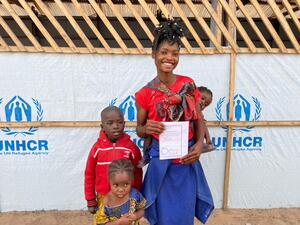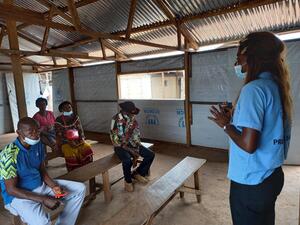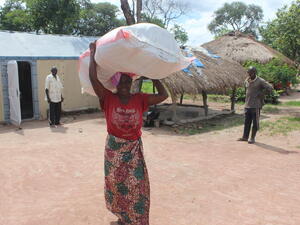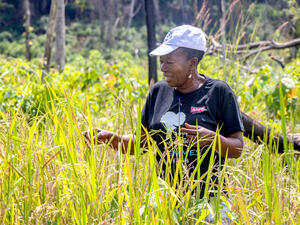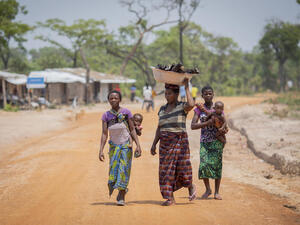A lifetime of uncertainty: decades in Zambia but still refugees
A lifetime of uncertainty: decades in Zambia but still refugees

A food distribution to refugees in Mayukwayukwa refugee settlement in Zambia.
MAYUKWAYUKWA REFUGEE SETTLEMENT, Zambia, July 15 (UNHCR) - Titus Musole was born 40 years ago in Zambia as his family fled from the fighting convulsing Angola and made toward the safety of this refugee settlement. Officially he is an Angolan refugee. And, not surprisingly, he has no desire to "return" to a country he has never seen.
"My father died a long time ago and my mother married another man with whom she went to Angola in 2004. I have never been to Angola," he said in the settlement in western Zambia. "I have never wished to return to Angola … the only home I know is Zambia. Angola is very foreign to me."
Musole's case is not unusual. Mayukwayukwa, established in 1966 to shelter Angolans fleeing war in their homeland, holds some 10,600 refugees, more than 95 percent of them Angolans and the rest from Africa's Great Lakes region. A survey last year showed only 4 percent were willing to repatriate. Some have been living in the settlement for 43 years; others were born and spent their entire lives there.
"My wife is actually Rwandan," said Musole, who was educated in Zambia where the language is English rather than the Portuguese used in Angola. He sees no prospect for earning a living in Angola and makes clear he will not willingly go to his official homeland.
Despite UNHCR assisting the voluntary return of 74,000 Angolan refugees from Zambia between 2003 and March 2007, figures this May showed Zambia was still hosting 81,000 Angolan refugees - 51,000 in camps and settlements and the rest settled by themselves in urban areas.
The 2008 survey on repatriation intentions found 7,000 of 26,000 Angolan refugees asked were willing to return, with the lowest rates in Mayukwayukwa where refugees have lived the longest. Because of this, UNHCR agreed with the governments of Angola and Zambia to assist those returning in 2009 on their own - providing cash grants but no longer organizing returns by air and road convoys.
This has given UNHCR a twin-track approach, helping those wanting to return to Angola, but also searching for a solution for the substantial numbers who remain. The immediate goal for UNHCR is making the Angola refugees as self-sufficient as possible.
"While we are assisting the Angolan refugees in the settlement to go home, we hope we will find a lasting solution for those who wish to remain in Zambia, as many were either born here or have lived in the country for a long time," said James Lynch, UNHCR representative to Zambia.
Lynch accompanied the ambassadors for Denmark and Norway to Mayukwayukwa earlier this month, both to witness the departure of 75 refugees who had decided to return to Angola and to see projects being implemented in the settlement, especially those funded by Denmark under the Strengthening Protection Capacity Project. The project aims to raise the Zambian government's capacity to protect refugees and find solutions in the longer term.
The ambassadors urged UNHCR and the governments of Zambia and Angola to encourage Angolan refugees to consider repatriation but noted that other solutions are needed for those who may opt to permanently remain in Zambia. For many Angolans, their only links are with Zambia, not Angola.
John Mukisi, a 38-year-old refugee, was not only born in Zambia five years after his mother fled Angola but is married to a Zambian. The intermarriage is not unusual.
"My wife is Zambian and we have six children, but those are all Angolan refugees despite having a mother who is a Zambian," he said. "Going back to Angola now, I will suffer… because it is like starting all over again. I want to ask the government to settle me where they can settle me because I am not ready to go."
Chitondo Kasoka has been living in Mayukwayukwa since it was opened in 1966. He arrived as a 21-year-old fleeing the initial Angolan war of independence - which was followed by decades of civil war - and makes his living trading fish and maize. He remains a refugee, unable under the current laws to receive the status of a permanent resident.
"For me, Zambia is now my home," the 64-year-old refugee said in fluent Nyanja, a lingua franca used in the Zambian capital Lusaka, 480 kilometres east of Mayukwayukwa. "I don't know Angola anymore."
By Kelvin Shimo in Mayukwayukwa Refugee Settlement, Zambia


